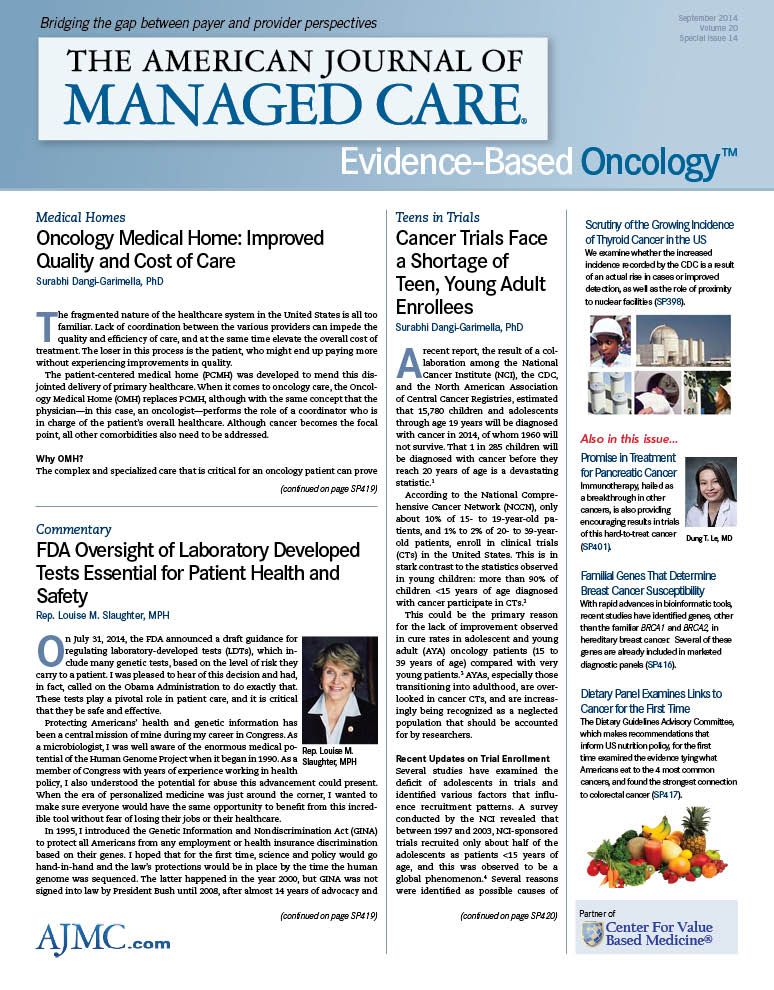- Center on Health Equity & Access
- Clinical
- Health Care Cost
- Health Care Delivery
- Insurance
- Policy
- Technology
- Value-Based Care
First PD-1 Inhibitor Approved for Melanoma
The long-awaited PD-1 inhibitor from Merck, pembrolizumab (Keytruda), was granted accelerated approval by the FDA. The approval grants patients with unresectable melanoma, who are non-responsive to other drugs, access to this immunotherapy,1 which could have a tremendous impact on the prognosis of the 76,100 new cases of melanoma estimated in 2014.2
“Keytruda is the sixth new melanoma treatment approved since 2011, a result of promising advances in melanoma research,” said Richard Pazdur, MD, director of the Office of Hematology and Oncology Products in the FDA’s Center for Drug Evaluation and Research. “Many of these treatments have different mechanisms of action and bring new options to patients with melanoma.”1
Keytruda is the first immunotherapy molecule in the pipeline—a checkpoint inhibitor—to be approved after ipilimumab (Yervoy; Bristol-Myers Squibb). Iplilimumab, a CTLA-4 inhibitor, has been used in the treatment of metastatic melanoma since 2011.3 Ipilimumab has since been evaluated in other indications, such as non-small cell lung cancer.
Keytruda is the first approved drug that blocks the PD-1 signaling pathway, which restricts the body’s immune system from attacking melanoma cells, and is intended for use following treatment with ipilimumab. For melanoma patients whose tumors express the BRAFV600 mutation, Keytruda is intended for use after treatment with ipilimumab and a BRAF inhibitor.1
The treatment was granted breakthrough therapy designation following preliminary clinical evidence that showed the drug may offer a substantial improvement over available therapies, which include ipilimumab, peginterferon alfa-2b, vemurafenib, dabrafenib, and trametinib. It also received priority review and orphan product designation. Priority review is granted to drugs that have the potential, at the time the application was submitted, to be a significant improvement in safety or effectiveness in the treatment of a serious condition.
Orphan product designation is given to drugs intended to treat rare diseases.1
The encouraging results with Keytruda resulted in the regimen being evaluated under the FDA’s accelerated approval program, which allows earlier patient access to promising new drugs even while confirmatory trials are ongoing, by using surrogate end points. Improved survival or disease-related symptoms with Keytruda have not yet been established.1
EBO
Meanwhile, Bristol-Myers Squibb and Ono Pharmaceutical Company filed a lawsuit against Merck arguing that Keytruda impinges on their patent for a method of harnessing the body’s immune system to fight cancer by blocking the PD-1 receptor. The lawsuit was filed on the same day as the market approval of Keytruda. Bristol-Myers Squibb and Ono already have a PD-1 inhibitor, nivolumab (Opdivo), approved in Japan. Nivolumab is expected to be submitted for approval to the FDA by the end of September 2014 for melanoma treatment, and by the end of the year for lung cancer.4 References
1. FDA approves Keytruda for advanced melanoma [press release]. Silver Spring, MD: FDA; September 4, 2014. http://www.fda.gov/NewsEvents/Newsroom/PressAnnouncements/ucm412802.htm.
2. Melanoma. National Cancer Institute website. http://www.cancer.gov/cancertopics/types/melanoma. Accessed September 9, 2014.
3. FDA approves new treatment for a type of latestage skin cancer [press release]. Silver Spring, MD: FDA; March 25, 2011. http://www.fda.gov/newsevents/newsroom/pressannouncements/ucm1193237.htm.
4. Loftus P. Bristol-Myers, Ono sue Merck over cancer-drug patent. The Wall Street Journal. http://online.wsj.com/articles/bristolmyers-ono-suing-merck-over-cancer-drug-patent-1410101449. Published September 7, 2014. Accessed September 10, 2014.

Ambient AI Tool Adoption in US Hospitals and Associated Factors
January 27th 2026Nearly two-thirds of hospitals using Epic have adopted ambient artificial intelligence (AI), with higher uptake among larger, not-for-profit hospitals and those with higher workload and stronger financial performance.
Read More
Exploring Racial, Ethnic Disparities in Cancer Care Prior Authorization Decisions
October 24th 2024On this episode of Managed Care Cast, we're talking with the author of a study published in the October 2024 issue of The American Journal of Managed Care® that explored prior authorization decisions in cancer care by race and ethnicity for commercially insured patients.
Listen
Motivating and Enabling Factors Supporting Targeted Improvements to Hospital-SNF Transitions
January 26th 2026Skilled nursing facilities (SNFs) with a high volume of referred patients with Alzheimer disease and related dementias may work harder to manage care transitions with less availability of resources that enable high-quality handoffs.
Read More

